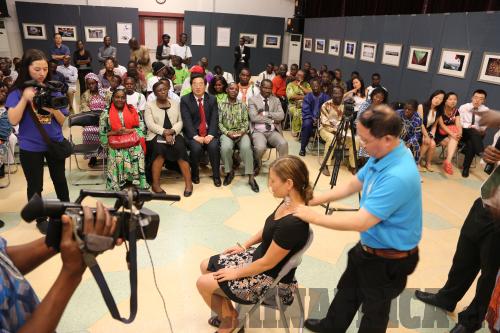|
 |
|
Liu Guangrui treats a patient (COURTESY PHOTO) |
Making friends
Besides lectures, Liu treated patients with backaches and headaches with his family's unique therapies on the spot. The audiences were shocked when they watched Liu ironing the patients' backs and heads under the protection of towels with a small burning stick. Both the towels and sticks were saturated with medicinal liquor. They were all staring at the burning stick through the whole process. After 20-minute treatment, the patients felt much better and held their thumbs up to show their approval.
Akodjo Kouloni never missed Liu's lectures. In his 40s, Kouloni showed great interest in Chinese culture and once learned traditional Chinese medicine for years in north China's Tianjin Municipality. Back in Benin, he started up a clinic practicing traditional Chinese medicine, which has been well received among locals.
"Why have I never seen such therapy in China?" he asked Liu. Liu explained that traditional Chinese medicine was a wide field and that just like Chinese kungfu, it had various schools.
Later, Liu offered free treatment to patients in a local hospital. Kouloni was impressed with the immediate results of Liu's therapy and asked Liu to take him to his hometown so that he could learn traditional Chinese medicine from Liu. He also wrote a special letter to express his sincerity. Liu was moved and promised to be his master.
For Liu, the greatest gain from his trip to Benin is the chance to meet more than 50 herbalist doctors who brought a variety of medicinal herbs. By observing and tasting, Liu made initial judgment on the herbs' medicinal properties, then confirmed with his peers. His accurate judgment won widespread approval.
However, his curiosity and dedication almost caused an accident. When visiting a medicinal herb garden in Porto-Novo, Liu found many herbs he had never seen before aside from aloes and prickly pears. Out of dedication to herbalism, he would taste every unknown herb to learn its medicinal value. When he ran across a giant plant that seemed to be a rubber tree, he was just to pick a leaf but was stopped by a scream. It turned to be that the plant was venomous and could only be used as an external application to cure severe sores. If it was eaten by mistake, it could cause coma or even death.
Future cooperation
After the trip, Liu learned that there was huge potentials for cooperation between China and Benin in the field of developing medicinal herbs.
The World Health Organization said that herbs were used for medical purposes in 162 countries around the world by 4 billion people. China has been using them as medicine for over 2,000 years, while in Africa, a continent rich in such herbs, the original inhabitants have also been using them since long ago.
In Liu's eyes, the various medicinal herbs and the large number of herbalist doctors are an intangible cultural heritage for Benin. However, medication with herbs has not been systematic in the country, although it is popular among ordinary people. "Without a systematic plan, fewer and fewer, and even no doctors will use medicinal herbs as modern medicine has become widely popular. It is urgent to take action," Liu said, suggesting that the two countries deepen cooperation in this field as China has gained years of unique experiences.
"We can help Benin establish a complete system from research to development," Liu added. "If the two sides can jointly develop new drugs made from those herbs in Benin and promote them around the world, it will be not only for the benefits of Benin people, but for mankind, and will even inspire research on herbalism in China."
Liu returned to China with joys as well as regrets. He was happy to have a foreign student, but felt regretful that he didn't meet the old lady once again. "When I was sick on my arrival to Benin, her prescription of medicinal herbs cured me. I would like to give her some Chinese medicine to show my appreciation to her kindness," Liu said.
|